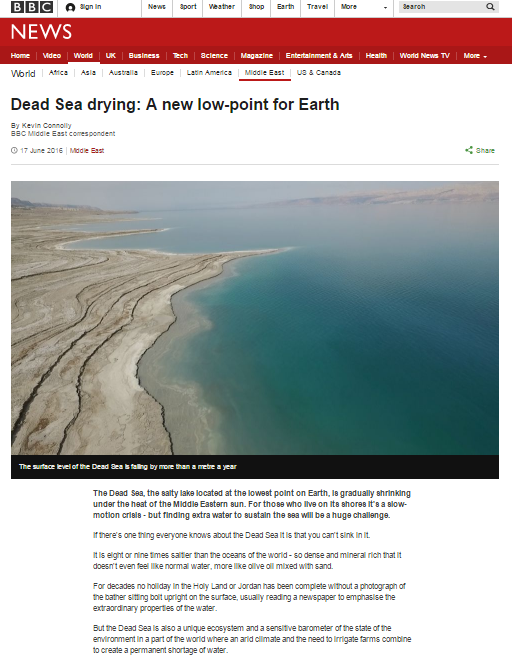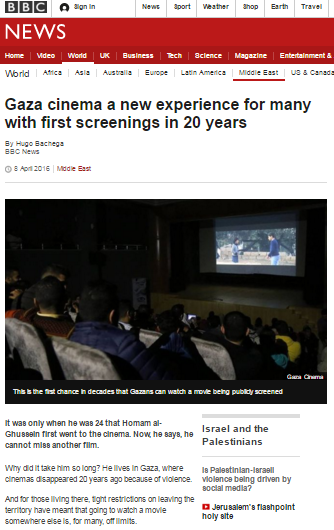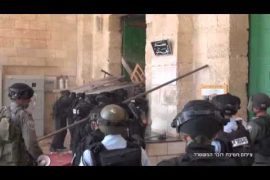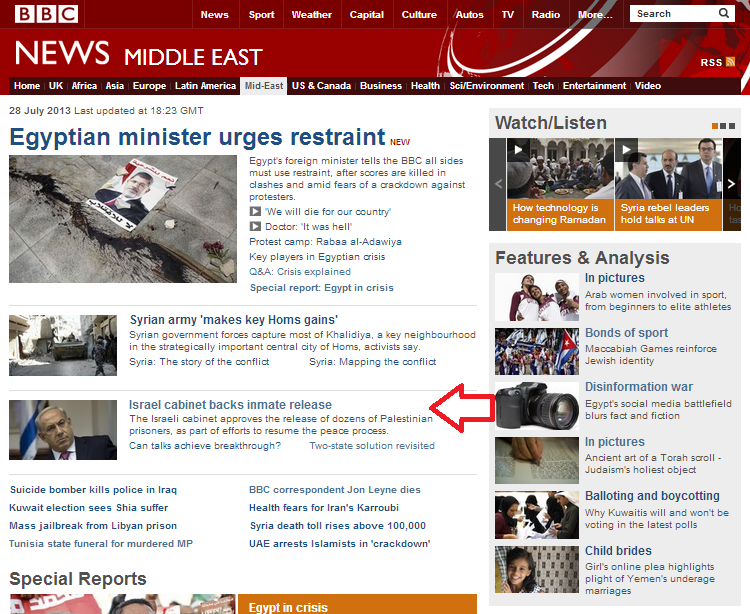On June 17th an article appeared in the ‘Features’ section of the BBC News website’s Middle East page under the title “Dead Sea drying: A new low-point for Earth“. Towards the end of Kevin Connolly’s long and at times rambling and repetitive piece, readers found the following:
“If the waters of the River Jordan are not to be restored, the likeliest scheme to revitalise the Dead Sea involves constructing a huge pipeline that would bring water across the desert from the Red Sea, far to the south. […]
Water would have to be desalinated first at the Red Sea (salty water would pollute the Dead Sea’s unique chemistry). It would then have to be pumped up to a great height and fed into enormous pipes that would channel the water across the desert to its destination.
The extra fresh water would benefit not just Jordan and Israel but the Palestinians too, so the World Bank is keen and the US is likely to provide at least some of the start-up capital.
But the technical, financial and political difficulties are forbidding and the pipeline is unlikely to be built soon, if indeed at all.”
In fact a conference on the project was held in Jordan just last month.
“Israel and Jordan presented the planned Red Sea-Dead Sea canal to potential investors at an international conference in Aqaba, Jordan on Monday. […]
At the conference, project representatives presented a tentative timetable and listed its benefits. These include stabilizing the dropping water level in the Dead Sea, providing a source of desalinized water for Israel’s Arava desert and for Jordan, and strengthening cooperation between Israel and Jordan.
The U.S. government has already stated that it will be contributing $100 million to fund the project.
A tender to fund the project was recently published. Some 94 major international corporations have paid a fee to receive the tender paperwork.”
Connolly’s article is also remarkable for the crucial omissions in its portrayal of irrigation related issues, as shown for example in this particular passage:
“Israel has a dam across the southern section of the Sea of Galilee which gives it control of the amount of water flowing into the Jordan – it regards the Galilee as a vital strategic water asset, even though it’s been steadily increasing the amount of fresh water it creates through desalination plants in the Mediterranean.
The Israeli government began taking water out of the Jordan Valley system in the 1950s, the decade before it completed the dam.
And this creates problems for farmers in both Jordan and the Palestinian territory of the West Bank – all of whom need water to irrigate their farms and feed their people.
But Israel has problems too – although it has enough money and enough technical resources to ensure its own people have enough water.”
Any objective portrayal of that topic would necessarily inform readers of the existing water related agreements between Israel and Jordan and Israel and the Palestinians. It would also inform them on the topic of water use efficiency. In contrast to Jordan and the Palestinian Authority, Israel recycles waste water for agricultural irrigation, produces water for domestic consumption in desalination plants and uses water conserving irrigation methods.
“The Palestinians absolutely refuse to irrigate their agricultural fields with treated sewage effluents. By comparison, more than half the agricultural fields in Israel are irrigated with treated waste water. Irrigating Palestinian agricultural fields with recycled water instead of fresh water would free up large amounts of water for home usage. This would greatly reduce the water shortage in many places.
Some Palestinian farmers irrigate their fields by flooding, rather than with drip irrigation technology. Drip irrigation, as practiced in Israel, brings water directly to the root of each plant, thereby reducing water consumption by more than 50 percent. Flooding fields causes huge water evaporation and leads to great waste.”
In other words, Connolly’s portrayal of a ‘rich’ Israel with “enough water” and – by inference – ‘poor’ Palestinians and Jordanians lacking water for crop irrigation is a very partial (although in no way unusual) picture of the real situation.
An additional notable feature of Connolly’s article is its use of politicised terminology – for example:
“Part of the [Dead Sea] shoreline is in the Palestinian West Bank under Israeli occupation so it’s possible that in future Palestinians too will reap the economic benefits of the sea’s unique properties.” (emphasis added)
Not only does that framing do nothing to enhance audience understanding of the history of the region, but it also conceals the fact that, like all other parts of Area C, the future of the area concerned is to be determined in final status negotiations according to the terms of the Oslo Accords, to which the Palestinians are of course party.
Do BBC editorial guidelines on accuracy permit the misleading of audiences by means of an unqualified and preemptive claim about the end result of a process which has yet to take place?
Related Articles:
Impartiality fail as BBC promotes FOEME objections to Red-Dead Sea project




